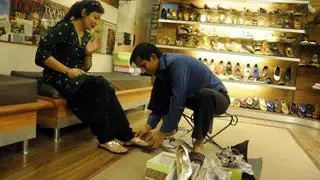It has been a roller coaster ride for Dentsu in India in the last decade. From 2014 to 2019, the Japanese agency network went on an aggressive acquisition spree, building tremendous digital strength and becoming a corpulent 23-brands agency. Then, it saw a sudden exodus of talent, lost some marquee clients and had a vacuum at the top for over a year. In May 2023, when Dentsu finally announced rank outsider, 49-year old Harsha Razdan as its CEO - South Asia, eyebrows were raised as he came from a consulting background (KPMG and Accenture). But there is a logic to the move. Razdan has a clear direction — by 2030, 50 per cent of Dentsu’s global business will come from the new area of CX or Customer Experience, the rest 50 per cent from traditional creative and media businesses.
The agency’s Cannes award-winning ‘The unfiltered history tour’ work for Vice Media | Photo Credit: Special Arrangement
Excerpts from a chat with the outsider in Indian advertising who has Kashmiri roots, an ancestral home in Ujjain, schooled for a bit in Lawrence School, Lovedale, did his engineering from IIT Kharagpur, and MBA from XLRI, Jamshedpur. The background may sound boringly corporate, but Razdan surprises you with his informality and sense of humour and as he says, he is no stranger to brand building.
This looks like an unexpected career shift?
I have done brand stints at the start of my career at Pepsi and Unilever. My first company was Pepsico where I used to manage Mountain Dew as a brand. But then moved on to consulting, doing a lot of digital and marketing transformation and then moved to the UK. At KPMG, my biggest role was to ensure that we listen to clients better to solve their challenges and problems. And that lead to Dentsu, which was always attractive. I knew the talent was there. When I look back, I think it’s like a full 360 degree has happened to me in my career — starting off from industry and brand roles, then going into consulting, looking at transformation from a tech perspective, now coming on the agency side. It completes the whole circle.
What are the tasks before you?
The first task was stability. Then getting back to client focus because somewhere in the last year-and-a-half we were distracted. And third is just soaking in the talent we have, because I’m looking to shape the new future of Dentsu. It can’t be without understanding where we stand.
So what is the new future of Dentsu? What’s the vision?
We are operating in three business units now. Media, creative and CX — which comprises data, cloud, martech and ad tech. Dentsu’s global vision is that by 2030, 50 per cent of the business should come from CX and the remaining 50 per cent from creative and media.
While that is the defined vision globally, for India, I would say, it would be by year 2026. I believe we are moving at that pace.
Dentsu had acquired a whole lot of agencies – is there CX strength in those buys?
We acquired a lot of agencies, but most of them were not in the CX space, to be honest. A lot of them were in the creative space and in the media space. They were only a few in the CX space, like Fractal Ink and Sokrati - these were two big ones. But all of the companies have sort of survived and done well.
The massive acquisition spree from 2014 to 2019 helped us to get where we are now. But at the same time, the clients had given us feedback that it’s getting confusing to interact with Dentsu because when you’re 23 companies and have 23 CEOs and CMOS, every day you have a different person talking to the client. So we had to make it easy for the client and look at compressing it into one P&L.
Going forward, we will continue to grow more rapidly in CX. In our second phase of growth, it will be a mix of organic and calculated inorganic acquisitions in CX primarily. But if something in media and creative, which is really wow, comes up, we are not saying no. So we are very growth focused, but we’re not going to be a voracious tiger, eating up everything.
Why are you betting so much on CX? What’s the imperative?
Our Global President and CEO, Hiroshi Igarashi, calls us the company at the intersection of marketing and technology. Why marketing and tech? With so many tech interventions coming in now, life is changing a lot for the chief marketing officers. We believe that the new age platforms, whether it’s in adtech or martech, are totally different from what we have seen many years back. The competitor set is all the tech companies — such as IBM, TCS, Accenture — who are growing very rapidly in the space. When you talk to clients — and I have met 90-odd CEOs face to face — most of them are spending money rapidly in this space. But when I zoom back, whose space and money was this earlier? It is actually our space. I know the customers best. If I don’t take my fair share then it just doesn’t make sense.
What the difference will be is that most of the tech players are coming tech down into marketing. But we will be going marketing up into technology. We are a customer-centred transformation company.
Any example of a seminal work that you’ve done in this space?
We have done a lot of work in the data domain. A lot of work in creating websites, on customer Journeys, product engineering, Gen AI based Analytics, CRM value realisation, cloud optimisation and marketing channel orchestration. Five out of the top seven auto companies in India partner with us and four of the top 10 FMCG companies depend on our insights for their market growth.
You have been talking of an East meets East philosophy. What’s that?
My idea is very similar to what our global CEO and President also realised recently. When you talk about India, you think you can make it for India from some place — Japan makes for India or the US makes for India. But what he realised is, with the talent we have here, you can make from India for the world.
Why I call it East-meets-East is that Japan and India have become much closer in Dentsu. Till the beginning of this year, we used to have India reporting to APAC, then APAC to the London office and then to Japan. Now India reports to Singapore and Singapore to Japan directly. The second reason is that we have a single cluster P&L for India, Sri Lanka and Bangladesh; all our talent in the countries are movable across different entities.
We have a Dentsu Global Services set-up and we have a Dentsu India client set-up and we have Dentsu Sri Lanka set-up. The Dentsu employees in India typically can be of two types. One would be people serving India. But the people in the Dentsu Global Services set-up here could be working with clients in the US. That team is 7,000 plus while the India team is 3,000 people. We have a One Dentsu philosophy — one HR policy, one leave policy and what we’ve done is rather than saying they are separate teams, think it’s one team. It gives a lot more opportunities for people to move across and yet stay within the company.
What is disrupting the advertising world other than AI?
I would say in this space it’s a thin balance between managing cost and growing revenue. But there are three mantras that we work on. One is to be client obsessed. Second is — our culture and the way we collaborate. The third thing is work on stretch targets. I’m telling people it’s OK to fail fast.
Your growth targets are stretched, but at the same time, the climate is such that clients are spending less, cutting costs due to inflation slowdown. And most of the ad growth seems to come only during the festive season.
There has been a softening between H1 2023 and H2, probably H1 2024 may be a little better because of the IPL and elections. But, we are not only a creative or media agency, we are a full-fledged agency, offering services across the spectrum of marketing and tech and hence the whole balance of portfolio is critical. As you get into these new areas, they are not exactly bunched around these two festive months. So I think it just helps open many more horizons for our company.








Comments
Comments have to be in English, and in full sentences. They cannot be abusive or personal. Please abide by our community guidelines for posting your comments.
We have migrated to a new commenting platform. If you are already a registered user of TheHindu Businessline and logged in, you may continue to engage with our articles. If you do not have an account please register and login to post comments. Users can access their older comments by logging into their accounts on Vuukle.